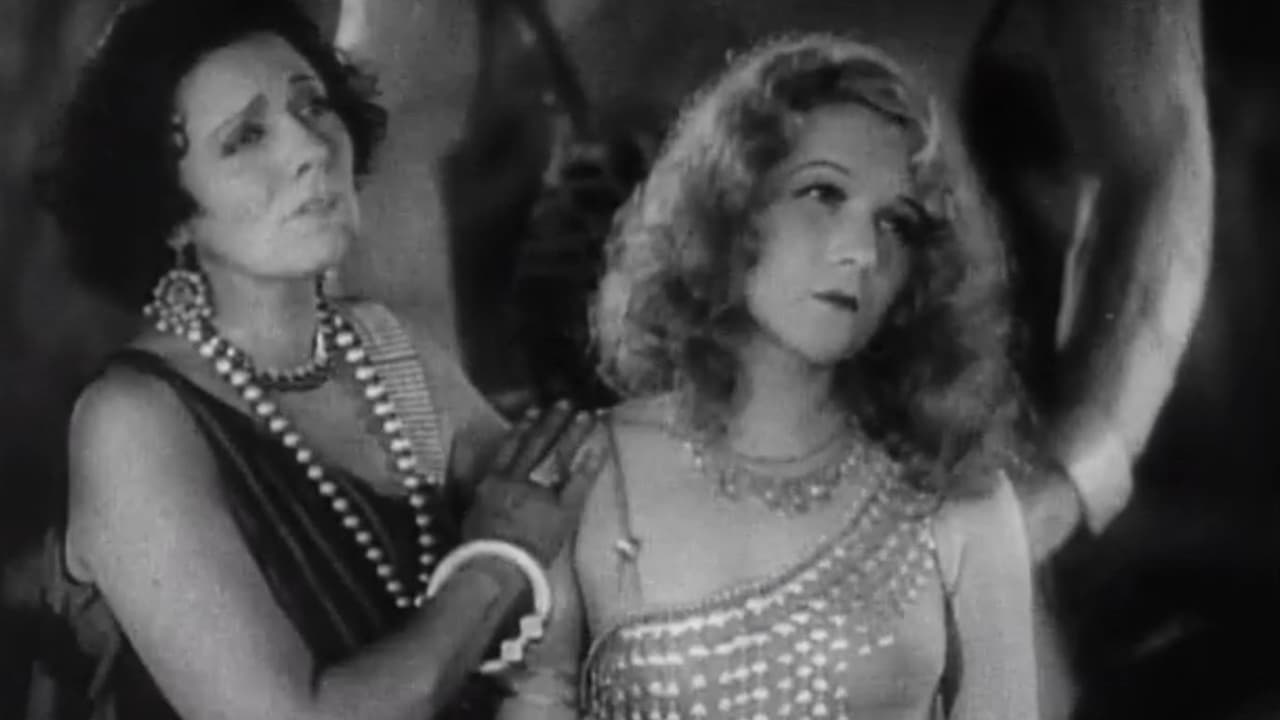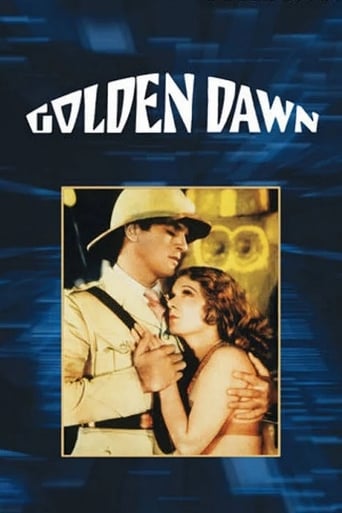

...and isn't boredom the worst cinematic experience one can have anyways? I watched Golden Dawn expecting a bore-fest full of static performances and wretched operatic screeching, having heard its reputation as the worst surviving movie musical ever made. Instead I experienced something so campy it is worthy of TCM Underground's Friday night cult film festivals.This film definitely did not turn out like Warner Brothers expected, I'm sure. It failed at the box office and is today a very unintentionally funny film. The film is set during the first World War in Africa. It is about a native girl, Dawn (Vivienne Segal), who has supposedly been blessed by the gods to appear white, thus marking her as the future bride of the native's god - a statue that appears to be a giant likeness of Mr. Bill from the old 70's skits on Saturday Night Live. A British soldier loves Dawn, but their love is thwarted at every turn both by the fact that the occupying Europeans don't want any trouble with the natives, which they'd have if Tom Allen (Walter Woolf King) eloped with the bride of the native god, and by Shep Keyes, a native bully and strong man who wants Dawn for himself.Shep (Noah Beery) is supposed to be an African native, yet his name and his accent are purely Gone with the Wind. Plus his black-face makeup is very obviously melting off of his body through his clothing under the hot Technicolor lights, but nobody seems to notice.There are a large group of civilian Americans and Europeans in the story, and the reason for their presence in this remote African village is never explained. Neither is any reason given as to why they all speak like they're from Queens. One of the things in this film that does work as funny and probably intentionally so is the wiry anemic Ned Sparks-like Lee Moran as Blink and Marion Byron as Joanna, Blink's rough and bossy girlfriend. The one number that works in this film is their rendition of the Song "A Tiger", which Joanna certainly is and Blink definitely is not.This film, made in 1930, is still using title cards to transition between scenes, something that was still common in the late Vitaphone era. However, even here there are laughs to be found. One title card reads "There was no joy among the natives. A draught was destroying them." As there is no mention of beer or wind in this film, I can only assume the title card writer meant "draught" to be "drought".For a little over an hour of campy fun in the tradition of "The Dueling Cavalier" in Singin in the Rain, you just can't beat this one.
... View MoreTrue, as a film, this is ludicrous, with "native African" Noah Beery speaking in a combination of U.S. Southern Black ("I'se gwine...")and cowboy dialects ("I'm a gonna pump ya plum full of lead")and some horrendous choreography. But there is some beautiful music from perhaps the greatest composer of Viennese operetta: Emmerich Kalman. This movie is based on Kalman's operetta "Golden Dawn," which premiered in New York in 1927. Especially noteworthy are two Kalman songs: "Just We Two" and a lovely ballad "You Are the One." To fully enjoy the music, one must,of course, ignore the fact that the lilting Viennese melodies and sometimes-Hungarian harmonies seem just a bit out of place in Africa.
... View MoreI recently saw a book on bizarre movies featuring cheap space monsters, Bad Biker Boys, and Bad Babes in Bikinis. That's not bizarre, that's boring! Now Golden Dawn, here's a bizarre movie for you! Prisoners of war in the middle of the African jungle with the natives wanting to do a human sacrifice...and in the middle of it all we have Lupino Lane (bless his soul) doing a happy go-lucky jig. Unlike most cult films, this had a budget, and was expected to be taken as serious film making when it came out.Believe me, I can see why people would give this a low rating. But if you're into saying "Huh?" and wondering what people were thinking when they were creating something...this is for you.
... View More...What a grand time they would have sending up this putrid songfest, based on a stage musical that wasn't very successful to begin with. One of the last of the first wave of movie musicals, and surely one of the worst: a preposterous operetta about a light-skinned African princess and the white soldier who loves her. (It turns out she's white, too, so it's okey-doke. I'm not spoiling anything.) Howlingly racist even for its day, what with the united forces of the noble Old World benevolently keeping the peace among the "heathens" of Boer-controlled Africa. (Can this be the same Oscar Hammerstein who wrote "Show Boat" more or less concurrently?) Ineptly shot, paced, and acted, with a number of white actors in blackface, including an unforgivable Noah Beery, his dusky makeup slowly melting under the hot lights.All that said, it's a rare chance to see the great stage star Vivienne Segal in a lead, and the famous British comic Lupino Lane do a fun eccentric dance. The Kalman score is quite pretty, too, if you can tune out the lyrics. But unless you're a connoisseur of operetta or a lover of grotesquely bad movies, the whole thing is just about unwatchable.
... View More